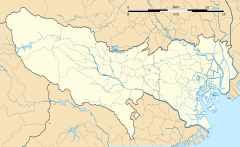Kotake-mukaihara Station
SI37 Y06 F06 Kotake-mukaihara Station | ||||||||||||||||||||||||||||||||||||||||
|---|---|---|---|---|---|---|---|---|---|---|---|---|---|---|---|---|---|---|---|---|---|---|---|---|---|---|---|---|---|---|---|---|---|---|---|---|---|---|---|---|
 Station entrance in 2019 | ||||||||||||||||||||||||||||||||||||||||
| General information | ||||||||||||||||||||||||||||||||||||||||
| Location | 2-16-15 Kotake-chō, Nerima-ku, Tokyo Japan | |||||||||||||||||||||||||||||||||||||||
| Coordinates | 35°44′38″N 139°40′43″E / 35.743808°N 139.678566°E | |||||||||||||||||||||||||||||||||||||||
| Operated by |
| |||||||||||||||||||||||||||||||||||||||
| Line(s) | ||||||||||||||||||||||||||||||||||||||||
| Platforms | 2 island platforms | |||||||||||||||||||||||||||||||||||||||
| Tracks | 4 | |||||||||||||||||||||||||||||||||||||||
| Construction | ||||||||||||||||||||||||||||||||||||||||
| Structure type | Underground | |||||||||||||||||||||||||||||||||||||||
| Other information | ||||||||||||||||||||||||||||||||||||||||
| Station code | F-06, Y-06, SI37 | |||||||||||||||||||||||||||||||||||||||
| History | ||||||||||||||||||||||||||||||||||||||||
| Opened | 1 October 1983 | |||||||||||||||||||||||||||||||||||||||
| Passengers | ||||||||||||||||||||||||||||||||||||||||
| Tokyo Metro, FY2013 | 154,779 daily | |||||||||||||||||||||||||||||||||||||||
| Services | ||||||||||||||||||||||||||||||||||||||||
| ||||||||||||||||||||||||||||||||||||||||
| ||||||||||||||||||||||||||||||||||||||||
Kotake-mukaihara Station (
Lines
[edit]Kotake-mukaihara Station is a junction of the following three underground lines.
Station layout
[edit]The station consists of two parallel island platforms serving four tracks.[1] Both platforms are equipped with waist-height platform edge doors.[2]
| 1,2 | Y Yūrakuchō Line | for Nagatacho, Toyosu and Shin-kiba |
| F Fukutoshin Line |
| |
| 3 | for Nerima, Shakujii-koen, Tokorozawa, Kotesashi and Hannō | |
| 3,4 | Y Yūrakuchō Line | for Wakoshi TJ Tobu Tojo Line for Shinrinkoen and Ogawamachi |
| F Fukutoshin Line | for Wakoshi TJ Tobu Tojo Line for Shiki, Shinrinkoen and Ogawamachi |
-
Kotake-Mukaihara Station platform 1 and 2
-
Kotake-Mukaihara Station platform 3 and 4
-
Track diagram
History
[edit]The station opened on 1 October 1983.[3]
The station facilities of the Yurakucho and Fukutoshin Lines were inherited by Tokyo Metro after the privatization of the Teito Rapid Transit Authority (TRTA) in 2004.[4]
Waist-height platform edge doors were installed in June 2008.[2]
Station numbering was introduced on all Seibu Railway lines during fiscal 2012, with Kotake-mukaihara Station becoming "SI37".[5]
Passenger statistics
[edit]In fiscal 2013, the Seibu station was the 5th busiest on the Seibu network with an average of 154,779 passengers daily.[6] In fiscal 2013, the Tokyo Metro station was used by an average of 154,779 passengers per day. Note that the statistics consider passengers who travel through Kotake-mukaihara station on a through service as users of the station, even if they did not disembark at the station.[7] The passenger figures for previous years are as shown below.
| Fiscal year | Seibu | Tokyo Metro |
|---|---|---|
| 2000 | 36,769[3] | |
| 2009 | 91,536[8] | |
| 2010 | 100,552[8] | |
| 2011 | 96,897[9] | 131,126[10] |
| 2012 | 104,207[6] | 139,446[11] |
| 2013 | 117,825[6] | 154,779[7] |
Surrounding area
[edit]- Keiai Hospital
- Komone Library
- Tokyo Musashino Hospital
Schools
[edit]- Musashino Academia Musicae
- Toshima High School
- Asahigaoka Junior High School
- Kami-itabashi No. 2 Junior School
- Mukaihara Junior High School
- Kami-itabashi No. 2 Elementary School
- Kotake Elementary School
- Mukaihara Elementary School
See also
[edit]References
[edit]- ^ Kawashima, Ryozo (March 2011).
日本 の鉄道 中部 ライン全線 ・全 駅 ・全 配線 第 12巻 東京 都 心 北部 [Railways of Japan – Chubu Line – Lines/Stations/Track plans – Vol 12 Northern Central Tokyo]. Japan: Kodansha. p. 28/67. ISBN 978-4-06-270072-6. - ^ a b
有楽町 線 :和光 市 駅 に設置 ! [Installation at Yurakucho Line Wakoshi Station] (PDF) (in Japanese). Japan: Tokyo Metro. 27 March 2012. Retrieved 15 April 2012. - ^ a b Terada, Hirokazu (July 2002). データブック
日本 の私鉄 [Databook: Japan's Private Railways]. Japan: Neko Publishing. p. 202. ISBN 4-87366-874-3. - ^ "「
営団 地下鉄 」から「東京 メトロ」へ" [From "Teito Rapid Transit Authority" to "Tokyo Metro"]. Tokyo Metro Online. 8 July 2006. Archived from the original on 16 May 2012. Retrieved 29 May 2022. - ^
西武 線 全 駅 で駅 ナンバリングを導入 します [Station numbering to be introduced at all Seibu stations] (PDF). News Release (in Japanese). Japan: Seibu Railway. 23 February 2012. Archived from the original (PDF) on 24 September 2015. Retrieved 10 February 2013. - ^ a b c
駅 別 乗降 人員 2013(平成 25)年度 1日 平均 [Average daily station usage figures (fiscal 2013)] (PDF) (in Japanese). Japan: Seibu Railway. Archived from the original (PDF) on 14 July 2014. Retrieved 2 September 2014. - ^ a b
各駅 の乗降 人員 ランキング [Station usage ranking] (in Japanese). Tokyo Metro. Retrieved 2 September 2014. - ^ a b
駅 別 乗降 人員 2010(平成 22)年度 1日 平均 [Average daily station usage figures (fiscal 2010)] (PDF) (in Japanese). Japan: Seibu Railway. Archived from the original (PDF) on 26 June 2011. Retrieved 31 January 2013. - ^
駅 別 乗降 人員 2011(平成 23)年度 1日 平均 [Average daily station usage figures (fiscal 2011)] (PDF) (in Japanese). Japan: Seibu Railway. Archived from the original (PDF) on 1 November 2012. Retrieved 2 September 2014. - ^
各駅 の乗降 人員 ランキング [Station usage ranking] (in Japanese). Tokyo Metro. Retrieved 2 September 2014. - ^
各駅 の乗降 人員 ランキング [Station usage ranking] (in Japanese). Tokyo Metro. Retrieved 2 September 2014.
External links
[edit]- Tokyo Metro station information (in Japanese)
- Seibu station information (in Japanese)







